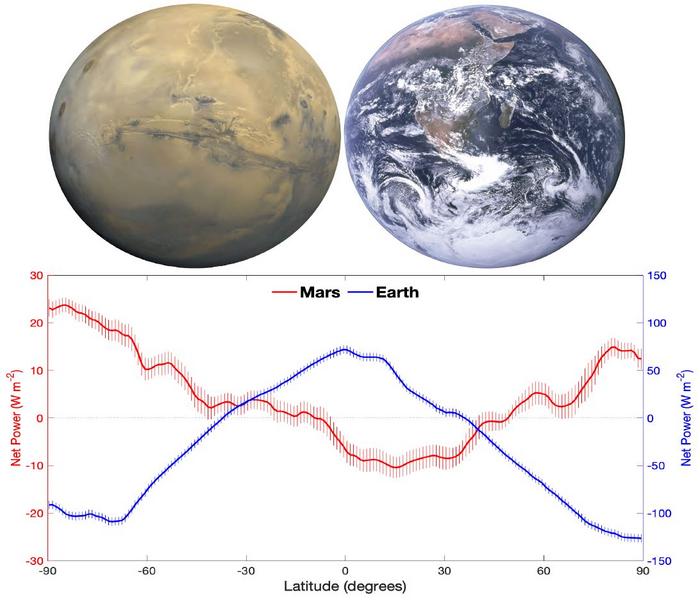A groundbreaking study led by researchers at the University of Houston has unveiled a new dimension in our understanding of the planetary climates, particularly focusing on Mars and its atmospheric dynamics. Initiated by Larry Guan, a diligent graduate student from the Department of Physics, the research delves deep into the radiant energy budget (REB) of Mars, establishing the first-ever meridional profile. This profile is instrumental as it articulates the balance between solar energy absorbed from the Sun and the thermal energy emitted by the planet, revealing significant implications not only for Mars but also for Earth’s atmospheric processes.
Central to this research is the collaboration among various experts, notably Professor Liming Li, a mentor in the Department of Physics, and Professor Xun Jiang, who brings in valuable insights from the Department of Earth and Atmospheric Sciences. Their combined efforts, with the assistance of notable planetary scientists, pave the way for a thorough examination and understanding of the intricate interactions of different atmospheric mechanics on both planets. The study impacts our comprehension of the climate variations and atmospheric circulation processes, which have profound implications for both Mars and Earth.
Published in the peer-reviewed journal AGU Advances, the findings distinctly contribute to the current academic discourse surrounding planetary climates. The publication is not merely a statement of data; it underscores the critical comparisons drawn between the two planets. The study articulates how the REB difference profoundly affects the climate systems, providing a comprehensive view that may transform future research directions in planetary sciences.
Guan highlighted that establishing Mars’ first-ever meridional radiant energy budget profile is a notable achievement. He pointed out that a thorough understanding of Earth’s large-scale climate relies heavily on REB profiles. Thus, having a comparable profile for Mars opens new avenues for climatological comparisons and lays the fundamental groundwork for the emerging field of Martian meteorology. This scientific endeavor accentuates the significance of comparative planetary readings, which brings forth a nuanced dimension of exploration in terrestrial planets.
The research emphasizes that while Earth typically showcases an energy surplus in its tropical regions and a deficit in the polar areas, Mars presents a striking contrast. The Martian REB profile reveals an energy surplus primarily in its polar regions, especially during the southern hemisphere’s spring season, while displaying energy deficits in the equatorial regions. This surprising inverse relationship between energy absorption and emission not only disrupts existing paradigms but also underscores the necessity for continual planetary observation.
The ramifications of such disparities in energy distribution are profound, influencing the very weather patterns that characterize each planet. On Earth, the excess energy in tropical regions incites significant warming and elevates atmospheric motions, which subsequently affect the overarching climatic conditions. However, on Mars, the reverse is evident. The notable polar energy surplus directs its unique atmospheric dynamics, which plays a critical role in unleashing seasonal global dust storms—a defining aspect of Mars’ weather phenomena.
The complex interplay between dust storms and the radiant energy budget further complicates the Martian climatic systems, revealing intricate feedback mechanisms that have far-reaching implications for both Martian weather and potential long-term climate stability. Guan noted that understanding the dust storms’ interactions with the REB and polar ice dynamics is crucial. These phenomena not only reallocate energy across the planet but also serve as a generator for Mars’ atmospheric circulation patterns.
In drawing comparisons, researchers indicated that Earth’s recent findings regarding global energy imbalances highlight the ominous contributions towards global warming—an unsettling echo in the context of increasing greenhouse gases. By contrast, Mars offers a unique landscape for study, characterized by its thin atmosphere devoid of human influences, driving the researchers to explore potential long-term energy imbalances on the red planet. This endeavor not only seeks to comprehend current climatic conditions but also aims to uncover the evolution of Mars’ climate over extensive timescales.
As researchers delve deeper into the contrasting energy budgets between Earth and Mars, the importance of sustained monitoring becomes increasingly clear. Understanding these disparities is fundamental to unraveling the mysteries of planetary climate dynamics across different celestial bodies. Professor Li lamented on the fascinating nature of these differences, which underscores the necessity for continued scrutiny of Martian atmospheric systems.
In recognition of this monumental achievement, the research team also included contributions from a robust ensemble of scholars and graduate students, including Ellen Creecy and Xinyue Wang from UH. They collaborated with internationally renowned planetary scientists such as Germán Martínez from Houston’s Lunar and Planetary Institute, Anthony Toigo of Johns Hopkins University, and Mark Richardson of Aeolis Research. This multidisciplinary effort exemplifies the unification of various scientific minds to advance our understanding of planetary sciences.
The implications of this study extend beyond the realms of academic study; it beckons a renewed sensitivity to humanity’s understanding of planetary mechanisms. Comprehensive studies such as these are pivotal not just for academic discussions but for bridging the gap between science and public understanding of the climatic crises. It reestablishes the importance of planetary research in broader discourses concerning climate change and environmental understanding in our interconnected universe.
In conclusion, the work paves the way for future explorations into Martian meteorology and energetics while reiterating the significance of comparative studies in the planetary sciences. The nuanced understanding of energy dynamics presents a critical precursor for all subsequent research while fostering a greater appreciation for the delicate balance of atmospheric processes symbolized by both Earth and Mars.
Subject of Research: Mars’ Radiant Energy Budget
Article Title: Distinct Energy Budgets of Mars and Earth
News Publication Date: 19-Dec-2024
Web References: AGU Advances
References: 10.1029/2024AV001389
Image Credits: Credit: Univ. of Houston Dept. of Physics
Keywords: Planetary Science, Mars, Earth, Atmospheric Science, Climate Change, Energetics, Meteorology, Dust Storms, Radiant Energy Budget, Climate Dynamics, Comparative Planetary Studies, Environmental Understanding.




